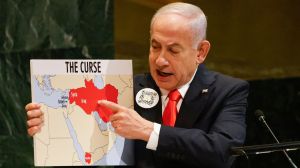The PERFECT entertainer
Richard Gere talks about his undying love for music,his passion for Buddhism and why Chicago is close to his heart.
Richard Gere talks about his undying love for music,his passion for Buddhism and why Chicago is close to his heart.
Richard Gere is one of the most charismatic actors in Hollywood. He was a special guest at the 34th Cairo International Film Festival this year. He had come with his wife and two children aged 20 and 10 respectively to soak in the historical heritage of Egypt over 10 days of festivities. Gere is a wonderful and versatile actor but sadly,he is more famous for having been named the Sexiest Man Alive by Peoples Magazine in 1999. He played a pimp in his debut film Report to the Commissioner in 1975. His latest assignment is The Double,a spy thriller based on John LeCarre novels of the same name. He has also completed work on a comedy called The Farelly Brothers.
Excerpts from an interview:
What do you think entertainment is all about?
Entertainment is all about being happy. As actors,we are responsible for spreading happiness among the audience who come to watch our films. In todays world,people are constantly being drawn away from happiness due to the disturbing situations we live in. Within this world of conflict,it is our duty to bring back viewers from a world of anxiety to a world of happiness.
Looking back on your long and successful career as an actor and social activist,what are your milestone films?
Its a difficult question to answer considering I have been around for four decades. But I must mention Chicago that fetched me the Golden Globe and Shall We Dance? that grossed $170 million worldwide. Looking for Mr Goodbar was among my first films where I featured in a supporting role opposite Diane Keaton followed by a starring role in Days of Heaven. I got noticed for my role in American Gigolo in 1980 and it established me as a leading man. Many significant films followed like An Officer and a Gentleman,Primal Fear,Pretty Woman,Sommersby,Runaway Bride and The Jackal. Then there was Todd Haynes semi-biographical film on Bob Dylan called Im Not There. But the real turning point is when I decided to change direction from studying philosophy and Greek mythology and turned to theatre and acting.
Tell us something more about your background in music and theatre which few know about.
I come from a musical family. My mother took us ( my four brother and sisters) to music courses. I learnt to play the trumpet. I have never given up music really though I do not do it professionally. I also won a gymnastics scholarship. My first brush with theatre was at the Provincetown Playhouse on Cape Cod in 1971 when I acted in a production of Rosencrantz and Guilderstern are Dead. But my first major acting role came with the original stage version of Grease in 1973. In 1980,a few years after I made by debut in films,I appeared in a Broadway production of Bent in which I played a homosexual holocaust victim. I do not think I will consider theatre any more because right now,I am a father who prefers to spend time with his kids.
Apparently you had reservations about taking up the role in Chicago.
That is right. I was hesitant about accepting the assignment in the beginning because I was a bit sceptical about how the play would be translated into film. But my doubts were laid to rest when I met the director. After having had a very successful stint as choreographer,he was turning director with this film. We worked very hard for the film,rehearsing for two complete months with a video camera. Some scenes were shot quite quickly. Surprisingly,the film looked stunning when finally screened though it did not have an extravagant budget. Chicago won the Academy Award.
What triggered your interest in Buddhism?
My parents were Methodists but my interest in Buddism began when I travelled to Nepal in 1978 with the Brazilian painter Sylvia Martins. I met the Dalai Lama and since then,I am a practising Buddhist and along with music composer Phillip Glass,founded the Tibet House that is dedicated to the preservation of Tibetan culture.
I am constantly working towards the movement to make Tibet independent and have been persistent in my mission to sustain human rights in Tibet.
Do you harbour fears about visiting the Middle East?
Not really because I have visited other areas like the West Bank and Ramallah during a curfew. I went inside an office and met Palestinians who were pretty surprised by my visit.
I think that the percentage of Israelis and Palestinians who want the war to continue is quite small. Unfortunately,the former US administration was wrong in dragging us into this war that hurt the Iraqis as well as the Americans. The US citizens were doubtful about this invasion that was the administrations mistake.







- 01
- 02
- 03
- 04
- 05
























